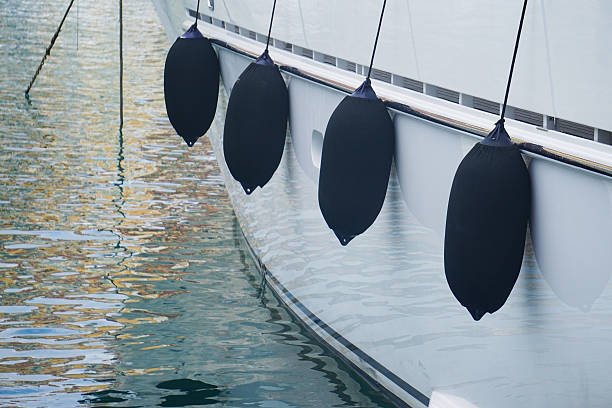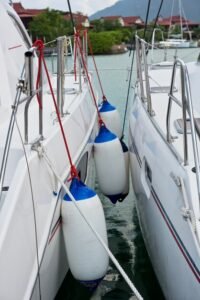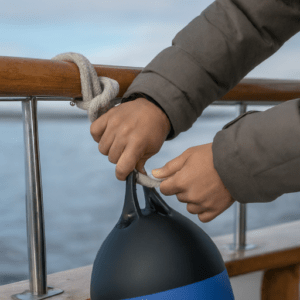How Many Boat Fenders Do You Really Need? You might think that boat fenders are just a nice-to-have when you’re out on the water, but that couldn’t be further from the truth! Many boaters believe that a couple of fenders will do the trick, especially if they’re just making short trips or using their boats occasionally.
However, not having enough fenders can lead to some serious damage to your boat when docking or tying up. So, let’s dive into why fenders are essential and how to figure out just how many you really need.
1. What Are Boat Fenders?
Boat fenders are your boat’s best friends when it comes to protection. Think of them as soft barriers that cushion your boat from the hard surfaces of docks, other boats, or any obstacles in the water. They are designed to absorb impact and prevent scratches or dents on your boat’s hull. Trust me; a little fender can save you a ton of headaches (and repair costs) down the line!
1.1 Types of Boat Fenders
Now, fenders come in various shapes and sizes, each suited for different needs. You’ll find inflatable fenders that are super lightweight and easy to store. There are also hard fenders that offer sturdy protection, ideal for larger vessels. And then you have cylindrical and round fenders, which are great for various docking situations.
1.2 Importance of Choosing the Right Type
Choosing the right type can really make a difference in how well your boat is protected. If you’ve ever asked yourself, “What size boat fenders should I get?” or “How many fenders do I need for my small boat?” you’re not alone! Many boaters face these questions, and understanding the basics can lead to better choices for your boating experience.
2. How Many Boat Fenders Do You Really Need?
A common misconception is that the number of boat fenders you need is a one-size-fits-all answer. Many folks think they can get by with just a couple of fenders, especially if they have a small boat or don’t dock often. But let’s be real: this can lead to some serious trouble! The right number of fenders depends on several factors, including the size of your boat, the type of boat you have, and the docking conditions you expect to encounter.
2.1 Factors to Consider
- Boat Size:
The length of your boat is crucial in determining how many fenders you need. A good rule of thumb is to have one fender for every 10 feet of boat length. So, if you have a 30-foot boat, you’ll want at least three fenders. If you’re asking, “How many fenders do I need for a 30-foot boat?” the answer is at least three, but more could be better depending on your circumstances. - Type of Boat:
Different boats have different requirements. For example, if you have a pontoon boat, you might need more fenders due to its wider structure. Asking, “How many fenders for a small boat?” often leads to needing at least two to three, but that can vary depending on the specific type of small boat you own. - Docking Conditions:
Consider where you dock. If you frequently tie up in crowded marinas or during rough weather, you’ll want extra fenders for added protection. Docking in calmer waters might allow you to get away with fewer fenders. So, if you’re thinking about how many fenders you need for docking in rough waters, I’d say err on the side of caution and add a couple more to your setup.
3. Choosing the Right Size of Boat Fenders
Once you know how many fenders you might need, it’s time to figure out what size to get. This is where many boaters get a little confused. It’s not just about grabbing any fender off the shelf; the size of your fender plays a huge role in how effective it will be at protecting your boat.
3.1 Importance of Selecting the Right Size
Choosing the right size fender ensures that you get maximum protection without any issues. If your fender is too small, it won’t absorb the impact properly, which could lead to damage on your boat. On the other hand, if it’s too big, it might be difficult to handle and store.
- How to Measure Your Boat for Fenders:
A good starting point is to measure the beam (width) of your boat. For boats under 25 feet, a fender that’s 6 to 8 inches in diameter is usually sufficient. For larger boats, consider fenders that are at least 8 to 12 inches in diameter. If you’re wondering about fender sizing for sailboats, the same principles apply: match the fender size to the beam of the boat for optimal protection. - Best Size for Boat Fenders:
If you’re still scratching your head about what size boat fenders to choose, remember that larger fenders offer more surface area for impact absorption. So, if you’re asking, “What are the best boat fenders for my boat type?” it’s important to take into account both your boat’s size and the conditions you typically face.
By keeping these tips in mind, you’ll be better equipped to choose the right fenders to keep your boat safe and sound, no matter where your adventures take you!
4. Placement of Boat Fenders
A common belief among boaters is that the placement of fenders doesn’t really matter as long as you have them. But let me tell you, that’s a huge misconception! Where you position your fenders can make a significant difference in how well they protect your boat. If they’re not placed correctly, you might still end up with damage, which is the opposite of what you want.
4.1 Where to Place Fenders for Optimal Protection
- Side Placement:
The most important thing is to place fenders at the right height along the side of your boat. Ideally, they should be positioned so they make contact with the dock or other boats at the waterline. This placement ensures that your boat’s hull is protected from bumps and scrapes. If you’re wondering how to achieve the best boat fender placement for maximum protection, remember that adjusting the height based on the tide and dock height is crucial. - Bow and Stern Fenders:
In addition to side fenders, it’s wise to have fenders at the bow and stern. This is especially true when docking against another boat or a dock that’s at a slight angle. You might ask, “How many fenders for a small boat?” In this case, having at least one fender at the bow and one at the stern can really help keep your boat safe. - Adjusting for Conditions:
Conditions can change quickly on the water, so be prepared to adjust your fenders accordingly. If you’re docking in rough weather or high winds, you might need to raise or lower your fenders to provide better coverage. Properly adjusting your fenders based on your docking situation can save you from some serious headaches later on.
5. Maintaining and Caring for Your Boat Fenders
Many boaters think that once they’ve got their fenders, they can just forget about them. But that’s a big mistake! Just like you would regularly check your boat for maintenance, your fenders need a little love too. Keeping them in good shape ensures they’ll be ready to protect your boat whenever you need them.
5.1 Best Practices for FenderCare
- Cleaning Your Fenders:
Regular cleaning is essential. Over time, dirt, saltwater, and grime can accumulate on your fenders, which can affect their durability and effectiveness. A simple rinse with fresh water after each outing can help keep them looking good. If you notice any stubborn stains, a mild soap can do the trick. Keeping your boat fender care routine in check can extend their lifespan significantly. - Inspecting for Damage:
Always take a moment to inspect your fenders for any signs of wear and tear. Look for cracks, punctures, or any signs that they might not be able to do their job properly. If you find any damage, it’s best to replace the fender before you head out again. A fender that’s seen better days won’t protect your boat the way you need it to. - Proper Storage:
When you’re not using your boat, make sure to store your fenders properly. Hanging them up in a cool, dry place can help prevent any unnecessary damage. Avoid leaving them in direct sunlight for extended periods, as UV rays can weaken the material over time. Proper boat fender storage practices can keep them in top shape for your next adventure.
By keeping your fenders clean, well-inspected, and properly stored, you’ll ensure they are always ready to safeguard your boat when you need it most. Proper maintenance is key to making sure your investment lasts and that your boating experiences remain enjoyable!
6. Where to Buy Quality Boat Fenders
You might think that buying boat fenders is as simple as grabbing the first ones you see at the store. But let’s clear this up right away: not all fenders are created equal! Investing in quality fenders can make a world of difference when it comes to protecting your boat. Cheap fenders might seem like a bargain, but they can end up costing you more in repairs down the line.
6.1 Recommended Places to Buy
- Marine Supply Stores:
Local marine supply stores are often the best bet for finding high-quality fenders. The staff usually knows their stuff and can help you choose the right fenders for your specific boat type and needs. Plus, you can see and feel the products before making a purchase, which is a big advantage. - Online Retailers:
Shopping online opens up a world of options. Websites like Amazon, West Marine, or Overton’s have a wide range of fenders to choose from, often with customer reviews that can guide your decision. If you’re curious about what size boat fenders are best for your needs, check out the reviews and ratings to see what other boaters recommend. - Second-Hand Options:
If you’re on a budget, don’t overlook the second-hand market! Places like Craigslist, Facebook Marketplace, or local boating forums can be goldmines for finding gently used fenders. Just make sure to inspect them for any damage or wear before making a purchase.
7. Conclusion
Now that you’ve got all the info on how many boat fenders you need, their placement, maintenance, and where to buy them, you’re well-equipped to make informed decisions. Remember, having the right number of quality fenders can save your boat from unnecessary damage and make your time on the water much more enjoyable. So, gear up with the right fenders and hit the water with confidence!
8. Additional Resources
If you’re looking to dive deeper into the world of boating and want more tips on how to keep your boat in tip-top shape, here are some great resources to check out:
8.1 Where to Buy Boat Fenders
- Local Marine Supply Stores: Find a store near you that specializes in boating supplies. Their staff can help you choose the right fenders for your boat.
- Online Retailers: Websites like West Marine, Overton’s, and Amazon offer a wide selection of boat fenders, often with customer reviews that can guide your purchase.
- Second-Hand Marketplaces: Check out platforms like Facebook Marketplace or Craigslist for gently used fenders that can save you some bucks!
8.2 Detailed Guides on Boating Safety
- BoatUS Foundation: They have a wealth of resources on boating safety and best practices to ensure you and your crew stay safe on the water. Visit their website here.
- US Coast Guard: The U.S. Coast Guard offers guidelines and resources on boating safety, including essential safety equipment. Check it out here.
8.3 Boating Maintenance Tips
- National Marine Manufacturers Association (NMMA): For detailed guides on maintaining various parts of your boat, the NMMA provides valuable information that can help keep your vessel in great condition. Explore their resources here.
- YouTube Channels: Channels like “Boat Works Today” and “The Boat Galley” share practical tips on boat maintenance, repairs, and upgrades that every boater should know. Just search for them on YouTube!
FAQs About Boat Fenders
1. How many fenders do I need for my boat?
Great question! A good rule of thumb is to have one fender for every 10 feet of your boat’s length. So, if you’ve got a 30-foot boat, aim for at least three fenders. But depending on where you dock and how you use your boat, you might want more for extra protection.
2. What size fenders should I buy?
When picking fenders, consider the width (beam) of your boat. For smaller boats under 25 feet, fenders that are 6 to 8 inches in diameter work well. If your boat is larger, look for fenders that are at least 8 to 12 inches in diameter. You want them to absorb impacts effectively!
3. Where should I place my boat fenders?
Place your fenders at the waterline on the sides of your boat. This helps protect the hull from bumps when docking. Don’t forget to add fenders at the bow and stern, especially when tying up next to another boat or a dock at an angle.
4. How can I clean and maintain my fenders?
Cleaning your fenders is simple! Rinse them with fresh water after each outing to remove dirt and salt. For tough stains, a little mild soap works wonders. Also, regularly check for cracks or damage so you can replace any worn-out fenders before they cause trouble.
5. Can I buy used boat fenders?
Absolutely! Buying second-hand fenders can save you some cash. Just make sure to inspect them carefully for any damage or wear before purchasing. If they look good and can protect your boat, go for it!
6. Why are fenders important for my boat?
Fenders are essential because they act as a cushion between your boat and docks or other boats. They absorb impacts and prevent scratches or dents on your hull, saving you from costly repairs in the long run.
7. What are the different types of boat fenders?
You’ll find a variety of fenders, including inflatable, hard, cylindrical, and round fenders. Each type has its own advantages, so consider your boat and typical docking conditions when choosing which ones to get.
8. How do I know if I need more fenders?
If you’re frequently docking in crowded marinas or facing rough weather, it’s a good idea to have more fenders. Having extra protection can help prevent damage during unexpected bumps or movements.
9. Can I make my own boat fenders?
While it’s possible to make DIY fenders, it’s often better to buy them. Commercial fenders are designed to withstand impacts and last longer. If you do decide to make your own, make sure they’re durable and can handle the pressure of docking.
10. What should I do if my fender gets damaged?
If you find any cracks or punctures, it’s best to replace that fender immediately. A damaged fender won’t protect your boat effectively and could lead to unwanted repairs. Keep an eye on your fenders to catch any issues early!




